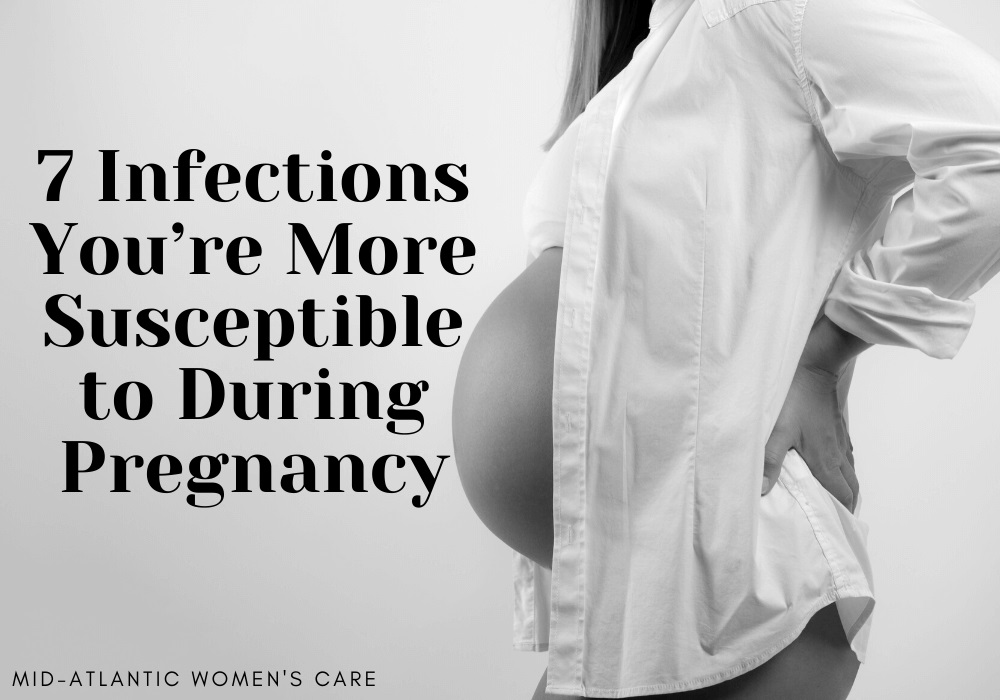During pregnancy, women become more prone to certain infections some mild while others can cause grave complications for mommy and baby. Because certain infections can be more prevalent among pregnant women, it’s important to know how to prevent and/or treat them.
Why does pregnancy make you more prone to infection?
It has been scientifically proven that the human body is in a constant state of defense, working to protect the body from potential damage caused by various bacteria and viruses. However, pregnancy affects the body’s physiological system and the number of hormonal changes that occur during this period can weaken the body’s immune system making it easier for bacteria to invade the body.
Urinary Tract Infections (UTIs)
UTIs are typically caused by bacteria that are present in the rectum, vagina, or on the skin entering the body through the urethra. Pregnant women are at an increased risk for UTI’s between weeks 6-24 of pregnancy. Why? The uterus sits directly on top of the bladder but during pregnancy, the uterus grows and can block the drainage of urine from the bladder which can cause an infection.
UTIs come with quite a few symptoms but the most telling symptom is a burning sensation when urinating.
If a UTI is left untreated, it can lead to a kidney infection in any woman that contracts one but with pregnancy, there are concerning complications that come with this. Kidney infections can cause early labor and low birth weight so it’s important that you get your UTI treated as early as possible. Many women will try to self-treat a UTI or just hope it goes away on its own but your best bet is to go to your doctor who will then prescribe you a 3-7 day antibiotics course. Learn more about UTIs here.
Chickenpox
If a pregnant woman catches chickenpox, both she and her baby may face serious health complications like pneumonia. If chickenpox develops during the first 20 weeks of pregnancy, the baby might face a risk of a rare group of birth defects known as congenital varicella syndrome which makes a baby more likely to develop skin scarring and eye, brain, limb, and gastrointestinal abnormalities. If chickenpox develops between the few days before you deliver and 48 hours postpartum, the baby could be born with a potentially life-threatening infection called neonatal varicella.
If you are exposed to chickenpox during pregnancy and you are not already immune, you should contact your healthcare provider immediately. From there, your healthcare provider will develop a course of action including an immune product or antiviral drugs, depending on how much the infection has developed.
Sexually Transmitted Diseases
Pregnant women can become infected by the same STDs as women who are not pregnant. Despite common misconceptions, pregnancy does not provide women or babies any additional protection against STDs. Many STDs are silent and don’t have any obvious symptoms so many people that have them are unaware but the result can be life-threatening for both the woman and her baby. Some of these issues are clear upon birth while others may not be discovered for months or even years after.
The best way to avoid getting an STD while pregnant is to be in a long-term mutually monogamous relationship where both parties have no STDs or use condoms every time you have sex.
Hepatitis B
Babies that are born to mothers with hepatitis B have a greater than 90% chance of developing chronic hepatitis B if they are not properly treated for it at birth. If a doctor is aware that a pregnant mother has hepatitis B, he or she can ensure that the proper medications are in the delivery room to help and prevent the baby from being infected. This requires that the newborn is given two shots immediately in the delivery room.
Hepatitis C
“In the United States, 1% to 2.5% of pregnant women are infected with hepatitis C virus (HCV), which carries an approximately 5% risk of transmission from mother to infant,” according to the Society for Maternal-Fetal Medicine. Hepatitis B can be difficult to detect because the first sign is nausea, a symptom commonly associated with early pregnancy, making it difficult to assess.
People with hepatitis C generally have no symptoms although some will have nausea and jaundice (yellow skin and eyes) when they first become infected. Sometimes the body can clear the virus on its own but what usually happens is that the virus stays in the liver which can cause carriers to develop severe liver damage or cancer of the liver. Most carriers, however, live for many years without major health complications.
Genital Herpes
Genital herpes are typically caught through contact with the genitals of an infected person or from oral sex. At the onset of the infection, a person will develop genital ulcers or painful blisters.
If a woman with genital herpes has the virus present in the birth canal during delivery, herpes simplex virus (HSV) can be spread to the infant, causing neonatal herpes, a serious, sometimes fatal condition. Neonatal herpes overwhelms the baby’s barely developed immune system, resulting in lasting damage to the central nervous system, mental retardation, or death.
If the infection occurs during the first trimester, it can be treated, but if it occurs towards the end of pregnancy, a cesarean section may be recommended to avoid the transfer of the disease to the baby.
Group B Streptococcus (GBS)
Anyone can develop GBS but pregnant women are at an increased risk and can pass the bacteria to the baby during delivery. Nearly 1 in 4 women have GBS which causes infections in the blood, lungs, skin, and bones, but in pregnant women, it can cause infections in the urinary tract, placenta, womb, and amniotic fluid.
Babies with GBS can develop serious health problems including pneumonia, sepsis, and meningitis.

